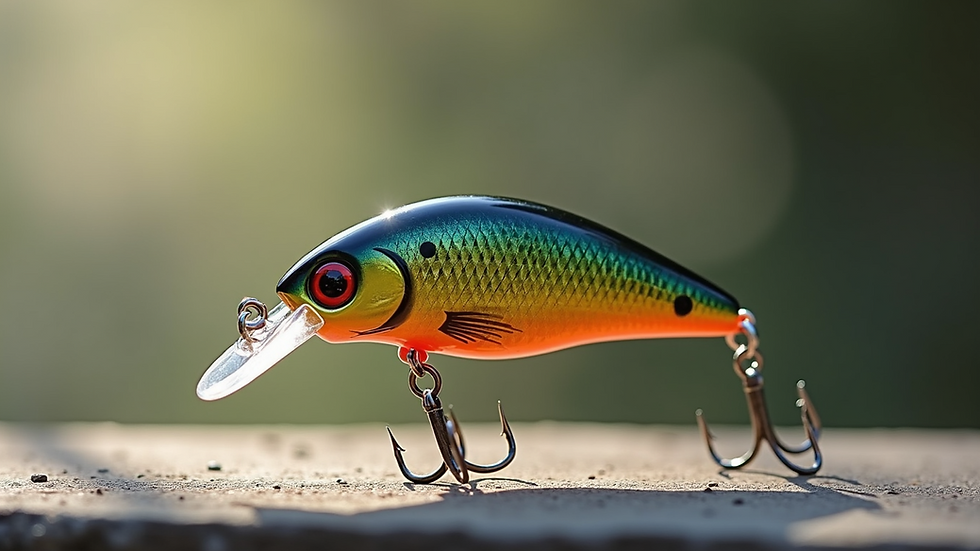Ready to Say Goodbye to Your Old Fishing Gear Here’s How to Toss It Wisely
- Flying Fishman

- Jul 7, 2025
- 4 min read
Fishing is a wonderful mix of tranquility and adventure. You connect with nature, feel the thrill of a catch, and create lasting memories on the water. But what happens when your beloved fishing gear starts to show signs of wear? Rods become tangled, tackle boxes overflow, and your favorite lures feel outdated. It’s time for a change, but how do you dispose of your old fishing gear responsibly? Don't worry! This guide will help you say goodbye to your old fishing gear wisely.
Why Dispose of Old Fishing Material?
Old fishing gear can degrade over time, losing its functionality and possibly harming the environment. For instance, discarded fishing lines can entangle wildlife, while broken gear can pollute waterways.
Taking the time to dispose of your gear correctly not only protects the environment but also allows you to give your old items a new lease on life.
Evaluate Your Fishing Gear
Before throwing anything away, take a moment to evaluate what you are ready to part with. Ask yourself:
Is it broken beyond repair?
Can it be cleaned and repurposed?
Does it still hold sentimental value?
Being specific in your evaluation can help you decide how to move forward.
Sorting the Usable Gear
Some items may need a little care. Here are some categories to consider:
Rods and Reels: If functional but worn, think about donating or selling them. Nearly 55% of anglers prefer quality gear that has a story.
Tackle Boxes and Lures: Give these items a thorough cleaning! Many lures can be refurbished for another round of fishing or gifted to beginners. You could even upcycle old tackle boxes for unique storage solutions at home.
When to Say Goodbye
If gear is cracked, rusted, or has frayed line, it’s time to let it go. Dispose of these items responsibly to ensure they do not end up harming the environment.
Responsible Disposal Methods

So, how do you dispose of old fishing materials? Here are some eco-friendly options that cover various types of gear.
1. Recycling
Certain fishing gear, especially metal components like rods and reels, can be recycled. Check with local recycling centers about their policies for accepting fishing gear. Here are some quick points to assist:
Metal Rods and Reels: Most of them are recyclable, but be sure to remove any plastic parts first.
Plastic Components: Some recycling centers accept fishing line and tackle, so a quick call can save you time.
2. Donation
If your gear still has life left in it, consider donating it to local charities, youth programs, or community organizations that promote fishing. Your gear could inspire a new generation of anglers.
Where to Donate:
Local Fishing Clubs: Many clubs accept used gear to provide to beginners.
Nonprofits: Organizations focused on outdoor education will often appreciate donations of gear.
Schools: Many educational institutions run fishing programs that could greatly benefit from your old items.
3. Resell or Trade
If you're savvy about business, selling or trading gear could be beneficial. Websites like eBay, Craigslist, or local Facebook groups are excellent platforms for this.
Garage Sales: Conduct a weekend sale to declutter while making a little extra cash. Many sellers report making anywhere from $50 to $200 by selling used gear.
Local Tackle Shops: Some tackle shops may offer trade-in or consignment options, allowing you to exchange old gear for store credit or cash.
4. Upcycling and DIY Projects
Turning old gear into something new can be an enjoyable project! Consider fun ideas like:
Tackle Box Planters: Add a unique touch to your garden.
Repurposed Rods: Create furniture or decor pieces that showcase your passion for fishing.
Lure Jewelry: This is a creative way to keep fond fishing memories alive.
Creativity and resourcefulness can breathe new life into fishing gear.
5. Proper Disposal for Waste
If your gear is truly unusable and cannot be recycled, it’s essential to dispose of it sensibly.
Landfill: This should be your last choice; if necessary, sort and clean your items first.
Hazardous Waste: Consult local regulations for disposing of specific materials, as many communities have designated disposal days for items that should not enter the trash.
What Not to Do

While it's essential to dispose of gear, avoid the following practices:
Flinging it into Nature: Littering is illegal and harmful to the environment.
Ignoring Community Recycling Programs: Familiarize yourself with local initiatives to ensure proper disposal methods.
Connect with Your Local Community
Getting involved in your local community is valuable for both you and aspiring anglers. Sharing knowledge about responsible fishing practices can foster community spirit and promote sustainability.
Join Fishing Clubs and Workshops
Engaging with experienced members can spark new ideas for gear disposal and help you learn the latest eco-friendly techniques. Many fishing communities also host workshops on gear maintenance.
Participate in Clean-Up Events
Join clean-up days for waterways you cherish. These events offer a great way to connect with fellow fishing enthusiasts and help improve local habitats.
Wrapping Things Up
Saying goodbye to old fishing gear is more than just throwing items away; it's an opportunity to practice sustainability, connect with your community, and nurture the next generation of anglers.
Whether you choose to recycle, donate, sell, or repurpose, know that every effort makes a difference. Enjoy your next fishing adventure with renewed gear and a clear conscience, knowing you've played a part in protecting our precious waters.
When it's time to clean out your fishing gear, remember the many ways to responsibly say goodbye. Together, we can keep our waterways beautiful for future generations.
With this guide, you're now equipped to make informed choices about your old fishing materials. So get out there and cast your line with pride!



